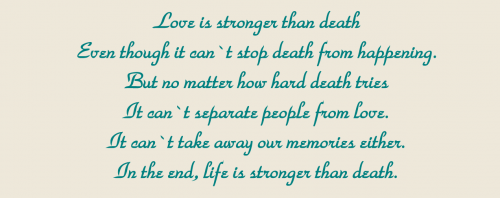
Most of us expect that we will outlive our parents. We may have seen them go through losing their parents. Recognizing that parents’ deaths are predictable does not reduce the painful impact when a parent actually dies. In fact, many people say they are surprised how hard it is grieving a parent’s death. Because losing a parent is a common and expected passage in life, adults dealing with it and those who want to support them try to soften the blow with perspectives on how old the parent was, the quality of the life the parent lived, the ending of illness and suffering and the natural order of things. The truth is that the death of one’s parent is one of the most important events in a person’s life.

You have not lived a day when your parent was not present in this world. You may have been very close or had a strained relationship or no contact at all. Still, the parent was somewhere and your concept of yourself and of life included the existence of your parent. Now, you face the emotional reality of going on without your parent. You can’t have any idea what that will be like, even if you’ve already dealt with the loss of your other parent. You know already that life has changed for you, that living with your parent gone is very different from when your parent lived.
While there is no comparing the amount of pain people feel when a parent dies – it’s 100% for all grieving people – the adjustment to the loss of your parent may be different. For some people, life circumstances and distance mean parents and children have limited contact and not much to do with each others’ daily lives. For others, there are daily phone calls, frequent visits, even sharing a home. The impact on day-to-day living will be different in these situations. Some people feel they have lost not only their mom or dad, but also their best friend and number one supporter. The person who has always been there to help one get through tough times is now unavailable – a kind of double loss.


Perhaps more than anyone else in our lives, our parents live on in us. We hear their voices, we live their values, we have absorbed their wisdom, we even come to resemble them physically. When you are trying to find your way through grief after your parent has died, you are likely to find your parent present in you even though absent from your life. You know the words of comfort and advice your parent would share with you. You will pass on their stories, carry on their traditions, perhaps take on some of their roles in the family. Some people have described the dawning of the realization that they are now matriarch or patriarch of their family.
Some handle their grief by talking about their parent, sharing memories, rehashing the difficult circumstances at the end of life. They are working toward the point where they can talk calmly instead of becoming upset again every time they think about or mention the parent. Others are more comfortable not talking very much, not wanting to lose control in front of others or burden others with their feelings, trying to be strong for other family members. Controlling communication seems to help them get through the sorrow of grief. In families, different styles of grieving can lead to misunderstandings, hurt feelings and resentment. Can’t the sister who has to talk about Mom all the time just be quiet and let us all get on with our lives? Does the brother who never mentions Dad even care that he’s gone? The differences can be especially grating at family gatherings after the death of a parent.
Grief is about love. We grieve the loss of the people we love the most. Though others may grieve the loss of the same parent in different ways, all are connected through their love for that parent.


Here are a few ideas that have proven helpful to many grieving people:
*Use your resources. Reach out for support from family, friends, members of your faith community - anyone who is part of your network of relationships. If you have established patterns, routines or rituals of spiritual, emotional and physical health, use them to deal with the current state of your life. Praying, journaling, working out and other activities can be valuable aids to both endurance and healing when you are grieving.
*Find new resources. There are all kinds of printed materials to provide information, inspiration and direction that can help grieving people. Ask around, visit a bookstore or library, go online. Look for titles and descriptions that speak to you. There are many grief-related connections online, including websites, articles, chats and blogs, as well as links to local support providers.
*Seek community or professional support. Hospices, funeral homes, faith communities and other organizations provide support groups, informational meetings, classes and counseling for grievers. Grief counselors, mental health therapists, spiritual leaders, chaplains and others can provide individual help as you work through your grief experiences.


